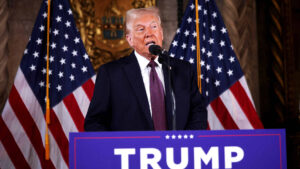Trump’s Economic Strategy: A National Emergency to Enforce Tariffs?
As we step into 2025, one question looms large in the financial landscape: how will newly elected President Donald Trump implement his ambitious tariff policies? According to multiple sources, the answer might involve declaring a national economic emergency, a move that could reshape the U.S. economy and its trade relations.
A Bold Move Toward Economic Control
Reports suggest that President-elect Trump is considering invoking the International Economic Emergency Powers Act (IEEPA). This law empowers the president to regulate international trade during a national crisis, potentially giving Trump the authority to enact the aggressive tariff strategies he championed throughout his presidential campaign. The IEEPA allows for swift action that could have far-reaching implications, especially when it comes to regulating imports from key trading partners like China, Canada, and Mexico.
This development comes at a critical time; following the news, stock futures showed signs of weakness while the U.S. dollar strengthened against a basket of other currencies. Market reactions like these highlight how swiftly news can affect investor sentiment and international confidence.
Navigating the Legal Landscape
However, as potential strategies unfold, it’s important to note that a final decision on declaring a national emergency has yet to be made. Trump’s team is reportedly exploring various legal frameworks, including nuanced sections of U.S. trade law, that could enable him to exert control without necessitating an emergency declaration.
This strategic maneuvering must be viewed in the broader context of Trump’s trade agenda, which has not only been about economics but also about redefining America’s role in the global market. Whether through emergency powers or other legal avenues, the administration seems poised to disrupt the status quo.
Tariffs Under the Microscope
During his campaign, Trump consistently advocated for steep tariffs—some proposals hinted at as high as 60% on Chinese imports. Just weeks after securing the presidency, he reiterated plans to impose a 10% across-the-board tariff on Chinese goods and even heftier penalties of 25% on imports from Canada and Mexico—a clear signal that the administration would take a hard line on trade.
Given these ambitious plans, one might wonder how such actions could reshape the economy. While some analysts predict that Wall Street might favor a more focused approach to tariffs, public sentiment on trade remains mixed. Many businesses, particularly small to medium-sized enterprises, may feel the brunt of such policies, leading to potential ripple effects across various sectors.
The Big Picture
At Extreme Investor Network, we always encourage our readers to look beyond immediate news headlines to understand the underlying economic currents. Trump’s tariff agenda will likely force businesses to rethink supply chains, adapt pricing strategies, and could even stir up inflationary pressures if costs rise for imported goods.
The implications of a declared national economic emergency could also reverberate globally. Other nations may respond reciprocally, setting off a chain reaction of trade tensions that could complicate international relationships and economic growth.
In conclusion, as the Trump administration grapples with the possibility of employing emergency powers to enforce its trade agenda, investors and businesses alike should remain vigilant. Prepare for a landscape that may shift rapidly based on political actions—a landscape where smart, informed investment decisions will be more crucial than ever.
Stay tuned as we continue to monitor this developing story and its implications for the economy. At Extreme Investor Network, we’re committed to bringing you insightful analysis that empowers your financial decisions. Don’t miss out—subscribe to our newsletter for in-depth coverage and expert commentary on your investment journey!

